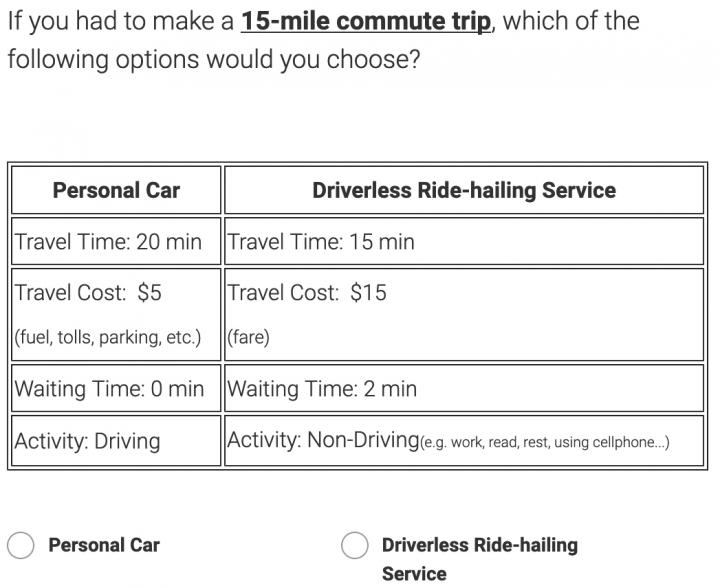
Credit: Gao et al./Transportation
Many Americans use a ride-hailing service — like Uber or Lyft — to get to and from work. It provides the privacy of riding in a personal car and the convenience of catching up on emails or social media during traffic jams. In the future, self-driving vehicles could provide the same service, except without a human driver.
But would consumers be willing to ride in a driverless car?
Researchers at the University of Washington studied how Americans’ perceived cost of commute time changes depending on who’s driving. Through a survey, the team found that people considered a ride-hailing service at least 13% “less expensive,” in terms of time, compared to driving themselves. If the researchers told people the ride-hailing service was driverless, however, then the cost of travel time increased to 15% more than driving a personal car, suggesting that at least for now, people would rather drive themselves than have an autonomous vehicle drive them.
The team published its results Aug. 6 in the journal Transportation.
“The idea here is that ‘time is money,’ so the overall cost of driving includes both the direct financial costs and the monetary equivalent of time spent traveling,” said senior author Don MacKenzie, a UW associate professor of civil and environmental engineering who also leads the leads the UW’s Sustainable Transportation Lab. “The average person in our sample would find riding in a driverless car to be more burdensome than driving themselves. This highlights the risks of making forecasts based on how people say they would respond to driverless cars today.”
The team set up a survey that asked people across the continental U.S. to select between a personal car or a ride-hailing service for a 15-mile commute trip. Half the 502 respondents were told that the ride-hailing service was driverless.
The researchers converted the responses to a score of how much respondents deemed that trip would cost per hour.
“If someone values their trip time at $15 per hour, that means they dislike an hour spent traveling as much as they dislike giving up $15,” said co-author Andisheh Ranjbari, a research engineer at the UW’s Supply Chain Transportation & Logistics Center. “So a lower number means that the time spent traveling for that trip is less burdensome.”
On average, respondents preferred a ride-hailing service over driving themselves: Ride-hailing services scored at $21 an hour and driving scored $25 an hour. In addition, if the researchers reminded respondents they could multitask during a ride-hailing service ride, their perceived cost of travel time decreased even more to $13 per hour.
Technically a ride-hailing service should be equally as convenient regardless of whether a human or an autonomous car is driving, but respondents disagreed. Driverless ride-hailing services scored at $28 an hour.
These results make sense, according to the team. Driverless cars aren’t commercially available yet, so people are not familiar with them or may be leery of the technology.
“We believe that our respondents are telling us that if they were riding in an automated vehicle today, they would be sufficiently stressed out by the experience that it would be worse than driving themselves,” MacKenzie said. “This is a reminder that automated vehicles will need to offer benefits to consumers before people will adopt them. To a first approximation, a ride-hailing service with driverless cars would need to offer services at a price at least $7 per hour less than human-driven cars, to make the driverless service more attractive.”
###
Jingya Gao, an analyst at Amazon China who completed this research as a student in a dual master’s program at the UW and Tongji University, is also a co-author on this paper. This research was funded by the U.S.-China Clean Energy Research Center.
For more information, contact MacKenzie at [email protected].
Media Contact
Sarah McQuate
[email protected]
Original Source
https:/
Related Journal Article
http://dx.




